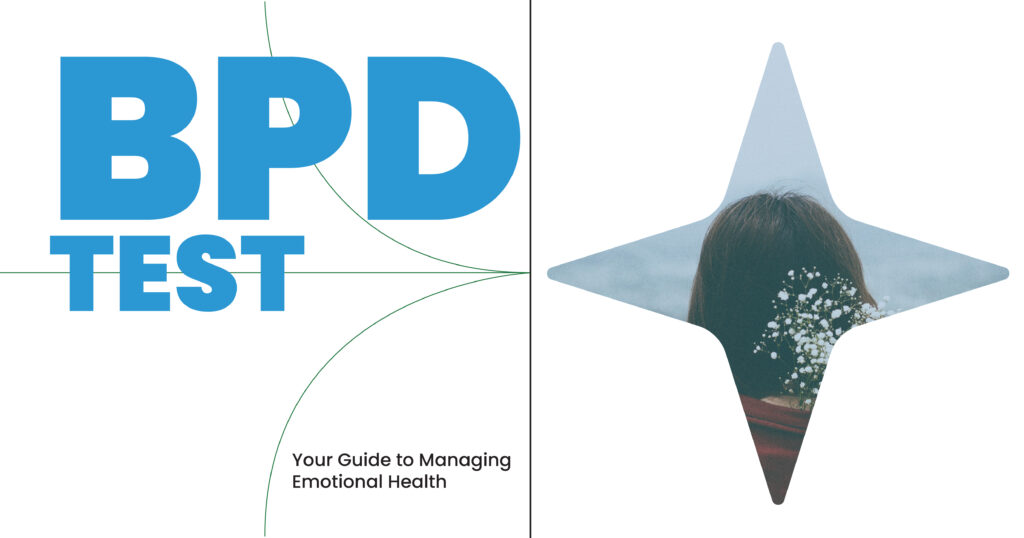BPD Test: Understand and Manage Your Emotional Health

Authored By:
Raleigh Souther

Edited By:
Chase Mcquown

Medically Reviewed By:
Dr. Alejandro Alva
- Last Updated:

Have you ever felt like you’re riding an emotional rollercoaster? Perhaps your relationships seem like constant battlegrounds, or you frequently feel as if you’re drowning in unidentifiable emotions.
If so, you are not alone, and it might be worth exploring as these emotions are linked to borderline personality disorder (BPD). A BPD test is the first step to getting to know yourself and understanding how to take control of your emotions. This guide will explain BPD, how it affects your life, and special coping steps.
Emotional Health and BPD
Emotional health refers to how well we deal with the signs, our capacity for emotional regulation, and our relationships with others. Emotional health for those with borderline personality disorder is often said to be like something they are constantly fighting against.
BPD is a psychological health condition that is characterized by extreme emotional instability, difficulty in forming and maintaining relationships, and fear of abandonment or impulsive behaviors.
But here is the thing, it isn’t your fault, and that doesn’t mean it can’t be managed. Managing the symptoms of BPD begins with knowing what they entail and how they look in your life.

Recognizing the Symptoms of Borderline Personality Disorder
If you are aware of the signs of borderline personality disorder, that can help you determine whether to get a BPD diagnosis for yourself or someone close to you. But the symptoms are not always obvious and are often mistaken for anxiety or depression.
Here are some common BPD symptoms:
- Intense mood swings that seem to come out of nowhere
- A chronic feeling of emptiness
- Extreme reactions to perceived abandonment (real or imagined)
- Unstable relationships with loved ones
- Impulsive behavior (spending, eating, risky activities)
- Self-harming behaviors or suicidal thoughts
- A shifting sense of identity or self-image
These symptoms are often debilitating and lead to emotional dysregulation, making it difficult to manage everyday life.
The Importance of Early Detection and Testing
If you suspect you might have symptoms of BPD, the first step is to get your BPD test done. Self-assessments are not official diagnoses, but if patterns of symptoms emerge that are closest to borderline personality disorder, it’s time to consult a professional.
Early detection can help you:
- Get the right kind of therapy for BPD
- Learn effective coping strategies
- Improve your relationships
- Reclaim your sense of self and confidence
Many people suffer in silence, thinking their emotional struggles are just part of who they are. But with the right help, things can get better.
Effective Strategies to Manage Emotional Health
Emotional dysregulation doesn’t have to be your battle for a lifetime. Some of the proven and widely used coping techniques for borderline personality disorder found helpful include:
Practice Mindfulness
Practice mindfulness to stay grounded. It can help you manage your thought patterns and allow room for choice of behavior rather than an automatic response.
Create a Routine
Stability matters. A daily routine reduces chaos and unpredictability, especially during emotional lows.
Use a Journal to Track Emotions
When you write things out, it points out patterns for you, right? For example, you are impulsive at night, or what causes emotional explosions? Awareness is the first step towards change.
Learn Distress Tolerance Skills
They are crisis management strategies, i.e. you can try deep breathing, distraction techniques, and calling a supportive friend to improve things.
Therapies and Treatments for BPD
There is no silver bullet or one-size-fits-all therapy, but many turn to structured therapy for BPD. Here are some options:
Dialectical Behavior Therapy (DBT)
The gold standard for Borderline personality disorder is DBT. According to Therapist Aid, DBT teaches practical emotional regulation skills through structured modules to help manage intense emotions and improve relationships.
Cognitive Behavioral Therapy (CBT)
According to a research paper, CBT helps you see and reframe distorted thinking patterns, which is excellent for boosting self-worth and triggering.
Medication (When Needed)
There is no specific drug to cure BPD, but medication for anxiety, depression, or mood stabilization can help with your general mental health.
Building a Support System for Emotional Well-being
You do not recover from your BPD symptoms on your own, and someone has to help with that. The support system is everything.
Lean on Loved Ones
Your close friends and family need to be educated about borderline personality disorder. If they know what you are going through, it’s less likely that they will respond with irritation and more likely to respond compassionately.

Join a Support Group
Sometimes, the best healing comes from talking with people who have experienced what you have. Search for online or in-person support groups on managing BPD.
Work With a Mental Health Professional
A therapist who specializes in therapy for BPD is a life-changing find. You don’t have to go through this alone.
Long-term Strategies for Maintaining Emotional Balance at Visalia Recovery Center
We at Visalia Recovery Center ensure that borderline personality disorder is controllable with individualized care, valid community support, and evidence-based treatment.
We provide individual treatment for individuals with emotional dysregulation. Our therapy staff has extensive DBT and CBT experience and a firm grounding in trauma-informed care. Having a borderline personality is not about “fixing” yourself. It is about learning to relate to your feelings and living a life you want to see.
If you are feeling extreme emotions, having mood swings, and your relationships are on the verge of despair, then maybe it is time for a BPD test. Visalia Recovery Center is here to help you on the road to recovery. Contact us today or fill out our contact form to speak with one of our specialists.
FAQs
What are effective coping strategies for managing mood swings and impulsivity in borderline personality disorder?
Effective strategies for managing mood swings and impulsivity in BPD are journaling, mindfulness, and distress tolerance strategies, which are super helpful.
How can emotional dysregulation in borderline personality disorder impact interpersonal relationships?
Emotional dysregulation causes conflicts, fear, and misinterpretation. If this pattern continues to grow, it can stress a relationship.
What therapy options are available for improving self-esteem in individuals with borderline personality disorder?
Therapies like CBT and DBT help individuals to improve self-esteem in personality disorders.
How does borderline personality disorder affect mental health and interpersonal communication?
BPD affects individuals’ interpersonal communication and mental health by causing extreme emotional reactions and fear of abandonment.
What are common signs of emotional dysregulation in borderline personality disorder?
The common signs of emotional dysregulation are recognized by sudden mood changes, overreactions, and impulsive behaviors triggered by specific situations.


